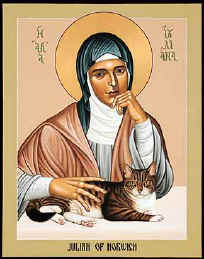Julian
of Norwich
Contemplative
8 May 1417
Julian
was born in En gland in 1342 during the time of the Black Death. This was a
difficult time throughout England, the plague having led to very bad social
conditions and the oppression of the poor. There was a shortage of labour, high
taxes and bad harvests; prices were soaring and unrest was bound to follow. The
climax of this unrest was the Peasants Revolt in 1381. The wider Church was also
in a sorry state: the Religious Orders were at loggerheads, the Papacy had left
Rome and was in exile at Avignon in France. Not half a mile from Saint Julian`s
Church in Norwich, the early followers of John
Wycliffe were being burnt in the Lollards pit, just the other side of the
river. It is into this situation that Julian comes. Nobody knows who she was:
she calls herself a simple, unlettered creature.
gland in 1342 during the time of the Black Death. This was a
difficult time throughout England, the plague having led to very bad social
conditions and the oppression of the poor. There was a shortage of labour, high
taxes and bad harvests; prices were soaring and unrest was bound to follow. The
climax of this unrest was the Peasants Revolt in 1381. The wider Church was also
in a sorry state: the Religious Orders were at loggerheads, the Papacy had left
Rome and was in exile at Avignon in France. Not half a mile from Saint Julian`s
Church in Norwich, the early followers of John
Wycliffe were being burnt in the Lollards pit, just the other side of the
river. It is into this situation that Julian comes. Nobody knows who she was:
she calls herself a simple, unlettered creature.
Julian was an anchoress, a person called to a solitary life, not cut off from the world, but one anchored in it. Her life was one of prayer and contemplation, a life highly thought of by people of the time. Her home was a small room, or cell, attached to the Church of Saint Julian, Bishop of Le Mans, just off one of the main streets of Norwich.
In 1373 the cloistered nun had found herself "visited" by her Lord as she lay near death. Upon recovering she described in writing the vivid visions vouchsafed to her (the "short text.") She refrained from speaking of them, wisely knowing that the visitation was brief while the disclosure of its meaning was protracted. She pondered them for the next twenty years, steeping them in prayer, living the truth disclosed in them, awaiting further illumination from their author and object. In 1393 she wrote the “long text”, a book called Revelations of Divine Love, elucidating their significance for her and readers that had been entrusted to her. During her lifetime, she became known as a counsellor, whose advice combined spiritual insight with common sense, and many persons came to speak with her. Since her death, many more have found help in her writings.
Agnostics and atheists frequently announce that the world's pain and distress loom so large as to contradict God and render faith in him impossible. They seem unaware that many whose lives unfold amidst unspeakable suffering nevertheless exemplify a throbbing faith and a vivid apprehension of God that not only attests the possibility of faith but even renders God undeniable. Julian's book, Revelations of Divine Love, was the distillate of a divine visitation that occurred amidst horrific developments in the fourteenth century.
Acknowledgements:
Text adapted from James
Kiefer's Christian Biographies, Saint
John the Baptist Church, Timberhill (no longer available), Victor
Shepherd: Heritage
Image from
Bridge
Building Images (no longer available)